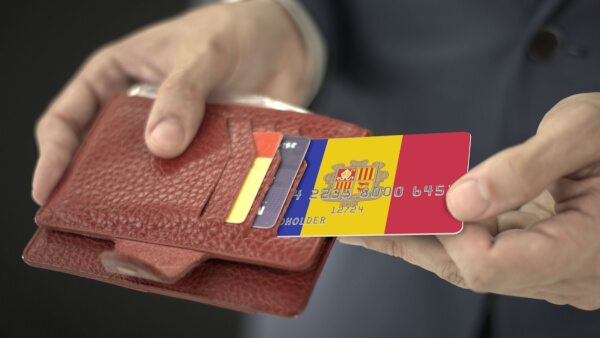How to open a UK bank account online in 2025
Check out our essential guide on how to open a bank account online, including bank types, required documents, fees, and more.

Whether you’re thinking of moving to the UK or you’ve arrived there already, at some point you’re going to need a bank account.
In the past, opening a bank account in the UK was very difficult if you were new to the country. Thankfully, these days, it’s become slightly easier.
In this guide, you’ll learn everything you need to know to open a UK bank account. This includes the documents you’ll need, the steps involved and which UK banks are most welcoming of new customers.
We’ll also show you an alternative to a bank account, the Wise account from the money services provider Wise.
It’s a travel-friendly, international account that lets you send, spend and receive in multiple currencies worldwide in 40+ currencies (including British pounds) all in one place.
Your money is always safeguarded and you’ll also get dedicated support when sending or transferring large amounts.
Learn about the Wise account 💰
Let’s start with the documents you’ll need for opening a bank account in the UK.
Although it can vary by bank, you’ll usually need just two documents: one to prove your identity and one to prove your address. This applies both in-branch and online.¹
Proving your identity is simple. You just need your passport, driving licence or identity card (if you’re an EU national).1
You’ll also have to prove your address by providing another document.
Every bank has its own list of documents that are acceptable as proof of address. Broadly speaking, these include:2
Of course, if you’re new to the UK, you might not have all the required documents on these lists.
Luckily, in recent years, banks have become a bit more flexible in terms of what documents they will accept as proof of address.
If you’re in the UK to study, for example, some banks will accept a letter from your University’s admissions office confirming your address.1
Some banks will also accept a letter from HMRC notifying you of your National Insurance number, or a bank statement from an existing bank (this doesn’t have to be a UK bank) which is now addressed to your new UK address.1
Alternatively, before you leave for the UK, ask your current banking provider to change your correspondence address to your new UK address. You may also be able to do this via online banking.
Once you’ve changed your address, ask your bank to send a bank statement to your new address by post to use to prove your new UK address.
If you don’t have any proof of address documents, you can contact the bank to discuss your individual circumstances and see if there’s a way to apply for an account.1
Of course, you can also try opening a current account with a non-bank provider such as Monese or Revolut, which depending on the provider may not always need proof of address.
Yes, it is possible to open a UK bank account from abroad, before you even arrive in the UK.
Your home bank may be able to set up an account for you if it has a correspondent banking relationship with a British bank.
Many major UK banks also have so-called ‘international’ or ‘expat’ accounts, like the HSBC expat bank account. These are designed specifically for non-residents, so they’re a great option if you don’t have the documents to prove your UK address.
In fact, you can even apply for an international account online. Barclays, Lloyds, HSBC and NatWest all offer international bank accounts.
Read more about how international accounts work below.
📚How International accounts work
However, opening a bank account from abroad or an international account may not be the right choice for you.
It might be the case that you’ll have to make a big initial deposit and commit to paying a minimum amount of money into your account each month.3
Some banks will also charge you a monthly fee in addition to these requirements.
This can make your bank account expensive to open and run, especially if you still don’t have a job.
There may also be other restrictions. For instance, you may not be able to close the account and switch to a better deal until a set period of time expires.
Opening a bank account in the UK for non-residents is possible, but you’ll need to choose a bank which caters to international customers.
For example, HSBC, which has an international service including accounts for expats and global citizens.
Otherwise, you may find that many banks do require proof of a UK address. This means you may have to wait until you arrive in the UK to apply for your new bank account.
The process of opening a UK bank account may vary between banks, but generally it involves the following steps:

Unfortunately, there is no straightforward answer to this question.
The banking industry in the UK is very competitive, and many banks have special products designed to attract specific types of customers.
This is great news. Whether you’re a student, a professional or a business, you’re bound to find something to suit your needs.
That said, you’ll also need to consider your personal circumstances, preferences and what you need to find the best current account in the UK.
Also, because you’re new to the UK, you have a limited credit history and not much documentation. Some banks are strict with their requirements, so opening a bank account with them will be difficult.
It’s usually easier to open an account with one of the UK’s largest banks - Barclays, Lloyds, HSBC or NatWest.
These banks have been in business for a long time. They also have a lot of experience dealing with foreigners, so they’re likely to be a bit more understanding of your situation and flexible with their requirements.
It’s a good idea to get in touch with a bank’s customer support before you try opening an account. That way, you can get more information and ask questions about any difficulties you may have.
And remember, there are alternatives to a bank account for managing your money in the UK or internationally.
Consider checking out the Wise account which allows you to send and receive money in 40+ currencies (including in GBP). You can also get a Wise card to spend like a local once you arrive in the UK.
There are many retail banks in the UK, each with their strengths and weaknesses. However, the biggest four UK banks are Barclays, Lloyds, HSBC and NatWest.5
Let’s have a look at what each of them have to offer.
Barclays is one of the oldest banks in the UK; and has more than 850 branches and local hubs around the country.4
It’s also probably one of the easiest banks to open an account with if you’re new to the UK.
In fact, you can even pre-apply for an account online before you arrive in the UK. However, once you get here, you’ll need to visit a branch with ID and proof of address documents to get your new account up and running.5
The Barclays Bank Account is free and comes with a Visa debit card as standard.6
Barclays also has special accounts for students and businesses.
The Barclays student account is free, includes a free overdraft of up to £1,500 over the course of your studies and a contactless debit card.7
Barclays also offers a few different business accounts, depending on the yearly turnover rate.
📚Opening a UK business account
Lloyds is another large bank in the UK, and has over 450 branches throughout the country.8
Opening a bank account is very easy, even if you have just arrived in the UK.
Lloyds has a free Classic Account which comes with a Visa debit card as standard. You can normally open it with just your passport or UK driving licence.9
Lloyds also has the Lloyds Student Current Account which offers a free overdraft of up to £1,500 for the first 3 years of your studies.10
You can also open a business account with Lloyds too.
HSBC has more than 327 branches around the UK,11 and it also operates in many other countries worldwide.
This can be a major advantage if you’re looking to open a UK bank account from abroad. If you bank with HSBC in your home country, it may be able to help you set up an account in the UK before you get here.
Opening an account with HSBC is pretty straightforward. The HSBC Bank Account is ideal for essential day-to-day banking when you are just arriving in the UK. It has no monthly fees and it comes with a contactless debit card.
If you’re studying in the UK, HSBC has both a Student Account and an International Student Account available. The latter comes with a debit card, online banking and everything else you need to manage your money. It doesn’t come with an overdraft as standard, but it does have exclusive accommodation offers to help you settle in.12
You can also look into opening an HSBC business account, with a range of accounts to choose from.
The last of the UK’s ‘big four’ banks, NatWest has a large network of branches and ATMs across the country.
NatWest has a Select Account as its fee-free everyday current account, which comes with mobile banking and a contactless debit card as standard.
NatWest also offers a student account, although you can only apply for this if you’ve been living in the UK for at least 3 years.13
You can also open a business bank account with NatWest with up to 2 years of free everyday business banking on select accounts.
📚Best UK accounts for international students
While Barclays, Lloyds, HSBC and NatWest are the four biggest banks in the UK, you can also check out the following banks and their everyday banking, student account and business banking offers:
Of course, it’s always best to look at what different banks and providers have to offer and see who has the best deal. Don’t commit to a product without at least having a look at what else is out there.
Want a truly international account that works pretty much anywhere? Check out the money services provider Wise, which offers a multi-currency account, global money transfer services and an international debit card.
Open a Wise account online and you can manage your money in 40+ currencies, including GBP, EUR, USD and many more. It’s not a bank account but offers many similar features.
When sending money internationally or converting currency, you’ll only pay a low, transparent fee* while also getting the mid-market exchange rate every time. This means no hidden fees or surprise margins.
And, you can spend locally or online in 150+ countries worldwide with your Wise card. It automatically converts currency whenever you spend, so there’s no need to change money or carry cash around with you.
You can also use a Wise account for sending or receiving large amounts internationally and if you need to convert currency, you’ll only pay a low, transparent fee*, ideal if you’re moving to the UK and will need to pay a mortgage deposit or you need to manage or send funds back home. Why not get in touch with our dedicated large transfers team via email or request a call back below.
Sources used for this article:
1. NatWest - What you need to open a bank account with Natwest
2. HSBC - What you need for an ID check with HSBC
3. HSBC - HSBC eligibility check
4. Barclays - Barclays locations
5. Barclays - Barclays account opening form
6. Barclays - Barclays Bank Account
7. Barclays - Barclays Student Additions Account
8. The Guardian - Lloyds plans to shut another 55 bank branches
9. Lloyds Bank - Lloyds Bank proof of identity
10. Lloyds Bank - Lloyds Student Current Account
11. HSBC - HSBC UK extends commitment to no new branch closures until 2026
12. HSBC - HSBC International Student Account
13. NatWest - NatWest Student bank account
Sources checked on 09-May-2025
*Please see terms of use and product availability for your region or visit Wise fees and pricing for the most up to date pricing and fee information.
This publication is provided for general information purposes and does not constitute legal, tax or other professional advice from Wise Payments Limited or its subsidiaries and its affiliates, and it is not intended as a substitute for obtaining advice from a financial advisor or any other professional.
We make no representations, warranties or guarantees, whether expressed or implied, that the content in the publication is accurate, complete or up to date.

Check out our essential guide on how to open a bank account online, including bank types, required documents, fees, and more.

Check out our essential guide on how to open a bank account in Jersey as a British expat, including documents, fees, banks and much more.

Check out our essential guide on how to open a bank account in Monaco as a British expat, including documents, fees, banks and much more.

Check out our essential guide on how to open a bank account in Andorra as a British expat, including documents, fees, banks and much more.

Read our rundown of the best Nationwide USD account alternatives available in the UK, including HSBC, Lloyds, Wise, Barclays, Revolut and more.

Read our essential guide to the Revolut USD Account, including info on features, fees, rates, limits and how to apply.